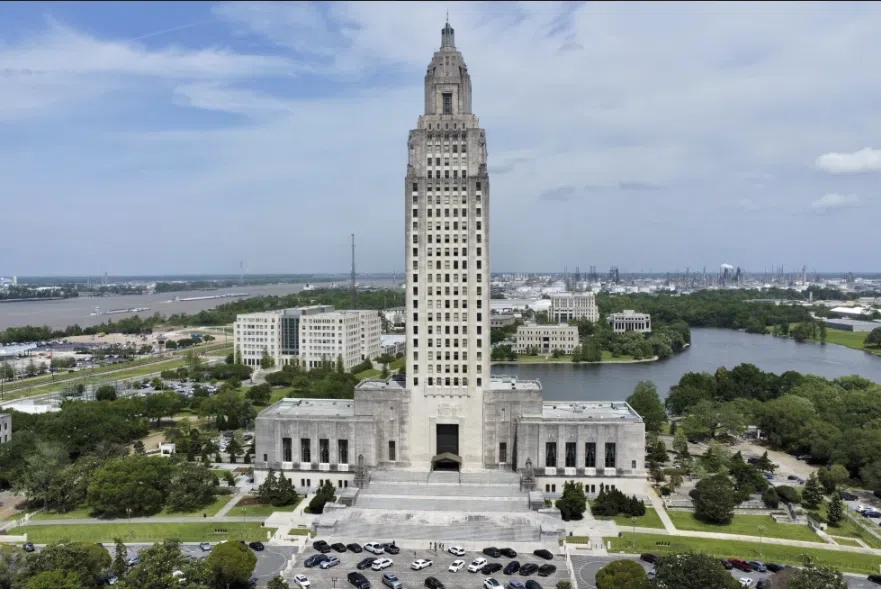BATON ROUGE, La. (AP) — Louisiana’s GOP-dominated legislature passed tax cuts on personal and corporate income on Friday in exchange for a statewide sales tax increase, giving Gov. Jeff Landry much of what he wanted after his original tax reform package faced mounting resistance from lawmakers and lobbyists.
The final passage of the tax measures wrapped up a special legislative session launched Nov. 6 by the governor and his allies. They said their purpose was to make the state’s tax code more business friendly, create jobs and reverse trends of outward migration from the state. It was the third special legislative session called by Landry, a Republican, since he assumed office in January.
Critics warned the tax reforms would primarily benefit corporate shareholders and wealthy taxpayers while the sales tax increase would exacerbate Louisiana’s regressive tax system where poorer households pay a higher percentage of their income on taxes.
Landry called the tax reforms “historic” and said that they allowed all Louisianans to keep more money in their pockets and would spur business investment.
“Today we have made generational change in this state,” Landry said. “We now stand at the threshold of a new era for Louisiana.”
Lawmakers approved a flat 3% individual income tax rate, leading to a $1.3 billion cut.
Previously, the personal income tax rate had stood at 4.25% for people earning $50,000 or more.
Louisiana Republicans said the measure advanced their goal of ultimately eliminating the income tax in the future.
“Income tax is a mandate; you have to pay it. You get punished for making more money,” said Republican Rep. Julie Emerson, who spearheaded the legislation.
She argued consumption-based taxes were fairer: “Sales tax is a choice,” Emerson said.
Lawmakers also noted that other Southern states like Arkansas, Mississippi and North Carolina have recently reduced their income taxes.
“We’re on the same trajectory as other states around us to be competitive,” Republican Sen. Franklin Foil said.
As part of the legislative package, lawmakers doubled the standard deduction for seniors and nearly tripled the standard deduction for individuals, effectively eliminating income tax on the lowest income households.
Lawmakers also redirected $280 million in vehicle sales tax funds from several major infrastructure projects for the next two years in order to help offset the income tax cut.
Corporate tax cuts
The state’s new corporate income tax rate will be a flat 5.5%, reducing the highest tier from 7.5%. Landry had wanted a 3.5% flat rate.
Louisiana’s corporate income tax rate had been the highest in the South according to the Tax Foundation, a conservative think tank.
Lawmakers repealed the 0.275% corporate franchise tax, a levy on businesses operating on the state worth more than $500 million in annual revenue that went to a state savings account. Republican lawmakers had decried the tax as an arbitrary penalty on business.
Landry and other Republican lawmakers had touted these tax cuts as crucial to removing obstacles to attract job-generating companies to the state and to improve Louisiana’s place on Tax Foundation’s rankings for business climate.
“Louisiana just became a much more attractive place to do business,” Louisiana Economic Development Secretary Susan Bourgeois said.
Sales tax hike
With the personal income tax reductions reducing annual revenue by $1.3 billion, Landry’s original plan had called for applying sales taxes to dozens of services like car-washing, dog-grooming and lobbying. He also sought to eliminate large tax incentives for the restoration of historic buildings and the film industry.
Those proposals were defeated — except for a new sales tax on digital goods and services — following stiff opposition from Republicans and special interest groups, leading to a bigger sales tax hike than Landry initially proposed.
Lawmakers raised the state sales tax to 5%, equivalent to an increase of one cent on every dollar spent. In 2030, the state sales tax will be reduced to 4.75%.
The state’s current sales tax stood at 4%, along with a temporary 0.45% sales tax that had been set to expire next year.
Louisiana already had the highest combined state and average local sales tax in the country at 9.56%, according to the Tax Foundation.
Louisiana has the 10th most regressive tax system in the country, according to the left-leaning Institute on Taxation and Economic Policy.
Jan Moller, executive director of the liberal think tank Invest in Louisiana, said the sales tax hike and other changes take the state “in the wrong direction.”
“I think it will ensure that low- and moderate-income families continue to pay a higher effective tax rate in Louisiana than those at the very top,” he said.
Republican leaders said they did not believe the increased sales tax would cancel out the benefits of the income tax cut for lower- and middle-income families.
Sen. Minority Leader Gerald Boudreaux said the Democratic Caucus had supported the bills — only one Democratic Senator dissented — in order to have a seat at the table in shaping the process, such as pushing to preserve the film industry tax credit.
“All of those changes represent what’s best for the state, and they’re now in a document — that was not previously there,” Boudreaux said on the Senate floor.
House Democrats were more fractured than their Senate counterparts, but many still voted in support of the overall tax package.
Constitutional changes
The tax reform package included a significant rewrite to a notoriously convoluted section of the state’s constitution, Article 7.
The amendment, which will go before voters on March 29, removes large amounts of tax exemptions from constitutional protection and intends to give lawmakers more latitude to end these exemptions in the future.
The constitutional amendment also enables a permanent $2,000 raise for teachers, made possible by liquidating several education trust funds to pay off early nearly $2 billion in school district debt.
And it inserts a “growth limit” on the amount of money lawmakers can direct to recurring expenses each year based on calculations of economic growth in the state — a measure proposed by conservative lawmakers.





Comments